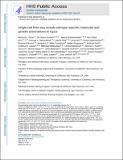Single-cell RNA-seq reveals cell type–specific molecular and genetic associations to lupus
Author(s)
Unknown author
DownloadAccepted version (1.597Mb)
Open Access Policy
Open Access Policy
Creative Commons Attribution-Noncommercial-Share Alike
Terms of use
Metadata
Show full item recordAbstract
<jats:p>
Systemic lupus erythematosus (SLE) is a heterogeneous autoimmune disease. Knowledge of circulating immune cell types and states associated with SLE remains incomplete. We profiled more than 1.2 million peripheral blood mononuclear cells (162 cases, 99 controls) with multiplexed single-cell RNA sequencing (mux-seq). Cases exhibited elevated expression of type 1 interferon–stimulated genes (ISGs) in monocytes, reduction of naïve CD4
<jats:sup>+</jats:sup>
T cells that correlated with monocyte ISG expression, and expansion of repertoire-restricted cytotoxic
<jats:italic>GZMH</jats:italic>
<jats:sup>+</jats:sup>
CD8
<jats:sup>+</jats:sup>
T cells. Cell type–specific expression features predicted case-control status and stratified patients into two molecular subtypes. We integrated dense genotyping data to map cell type–specific cis–expression quantitative trait loci and to link SLE-associated variants to cell type–specific expression. These results demonstrate mux-seq as a systematic approach to characterize cellular composition, identify transcriptional signatures, and annotate genetic variants associated with SLE.
</jats:p>
Date issued
2022Department
Massachusetts Institute of Technology. Department of BiologyJournal
Science
Publisher
American Association for the Advancement of Science (AAAS)
Citation
2022. "Single-cell RNA-seq reveals cell type–specific molecular and genetic associations to lupus." Science, 376 (6589).
Version: Author's final manuscript